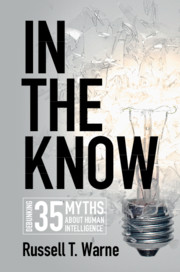Book contents
- In the Know
- In the Know
- Copyright page
- Dedication
- Contents
- Figures
- Tables
- Acknowledgments
- Preface
- Introduction
- Section 1 The Nature of Intelligence
- 1 Intelligence Is Whatever Collection of Tasks a Psychologist Puts on a Test
- 2 Intelligence Is Too Complex to Summarize with One Number
- 3 IQ Does Not Correspond to Brain Anatomy or Functioning
- 4 Intelligence Is a Western Concept that Does Not Apply to Non-Western Cultures
- 5 There Are Multiple Intelligences in the Human Mind
- 6 Practical Intelligence Is a Real Ability, Separate from General Intelligence
- Section 2 Measuring Intelligence
- Section 3 Influences on Intelligence
- Section 4 Intelligence and Education
- Section 5 Life Consequences of Intelligence
- Section 6 Demographic Group Differences
- Section 7 Societal and Ethical Issues
- References
- Index
3 - IQ Does Not Correspond to Brain Anatomy or Functioning
from Section 1 - The Nature of Intelligence
Published online by Cambridge University Press: 22 October 2020
- In the Know
- In the Know
- Copyright page
- Dedication
- Contents
- Figures
- Tables
- Acknowledgments
- Preface
- Introduction
- Section 1 The Nature of Intelligence
- 1 Intelligence Is Whatever Collection of Tasks a Psychologist Puts on a Test
- 2 Intelligence Is Too Complex to Summarize with One Number
- 3 IQ Does Not Correspond to Brain Anatomy or Functioning
- 4 Intelligence Is a Western Concept that Does Not Apply to Non-Western Cultures
- 5 There Are Multiple Intelligences in the Human Mind
- 6 Practical Intelligence Is a Real Ability, Separate from General Intelligence
- Section 2 Measuring Intelligence
- Section 3 Influences on Intelligence
- Section 4 Intelligence and Education
- Section 5 Life Consequences of Intelligence
- Section 6 Demographic Group Differences
- Section 7 Societal and Ethical Issues
- References
- Index
Summary
The biologist Stephen Jay Gould’s most popular work was The Mismeasure of Man, a hefty book (over 400 pages in its revised version) arguing that intelligence testing and intelligence research were part of a lengthy history of social scientists who have been blinded by their social views in order to bend the data to support their incorrect preconceived (and often racist) beliefs (Gould, 1981, 1996). One of the main arguments in Gould’s book is that intelligence is a reification, which is the term for an abstract idea that is treated as if it were real. The quote above encapsulates one of Gould’s reasons why he believes that intelligence or g is not a real entity: it has no apparent connection with the physical or functional properties of the brain. While this belief was not completely unreasonable when Gould wrote the first edition of his book in 1981, neuroscientists have since amassed findings that suggest that g has real connections to the anatomy and functioning of human brains.
- Type
- Chapter
- Information
- In the KnowDebunking 35 Myths about Human Intelligence, pp. 40 - 45Publisher: Cambridge University PressPrint publication year: 2020

